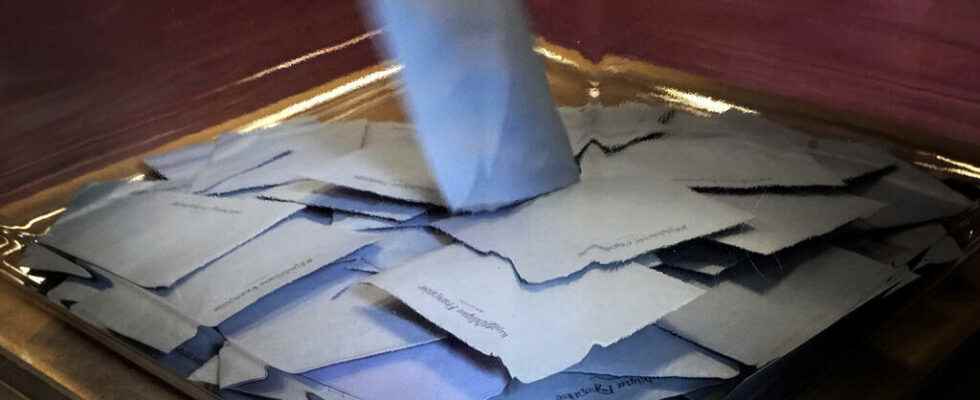For the first time in a presidential election, French prisoners can vote directly in prison. At the Seine-Saint-Denis remand center in Villepinte, the vote for the second round took place this Friday, April 22. Report.
Apart from the guards and the heavy barred doors, the polling station set up in the prison gymnasium looks like any other. Election posters of Emmanuel Macron and Marine Le Pen plastered on the walls. Tables to verify the identity of voters and collect ballots. Voting booths lent by Villepinte town hall. And even an urn in which to slip your envelope. The administrative staff of the prison and those of the reintegration and probation services act as assessors.
Prisoners go to the polls at their convenience, building by building. The prison population is young and many were voting for the first time. ” Before my incarceration, I did not have the head for that “explains one of them who prefers to remain anonymous. ” I have been imprisoned for 18 months, I had time to think and when I saw that it was the elections, I asked to register on the electoral lists. »
Everyone is delighted with this new method of voting, which reminds them that they are still citizens. ” We have a route to follow, there is a voting booth and at the end, we put the ballot in the little box and we are told that we have voted. It’s as if we were outside. We are part of society and it feels good. » « It is true that the conditions in detention are special, but it is important for us to continue to participate in this life outside that awaits us outside. “, explains Iman who has also just voted.
45% participation
This postal vote had been tested during the European elections of 2019, it has since been generalized. “By correspondence”, because the ballots are counted at the Ministry of Justice. But for detainees, the process is therefore almost identical to that of citizens on the outside. Nationally, only 1,000 detainees were able to vote by proxy or by obtaining an exit permit during the last presidential election in 2017. This time, thanks to this postal vote, 11,000 were able to fulfill their duty. as a citizen during the first round two weeks ago.
At the Villepinte remand center, the prison team carried out an awareness-raising exercise with prisoners. She posted the programs of the twelve candidates. ” They didn’t know them all, many came to see us to ask us: “Who is he? What is his program?” Obviously, we weren’t allowed to give them any directions, but we heard them chatting a lot. “, laughs Michaël Merci, the director of the remand center.
In this establishment, filled – like many others – to 180% of its capacity, where the prisoners are obliged to be two or three in cells of 9 to 13 m², the educational work of the prison team has finally paid off. ” In the first round, of the 600 people who were eligible to vote, 320 registered voluntarily. With the game of releases and transfers, 271 were able to vote “, continues the director of the prison. That is a very honorable participation rate of 45%.
Michaël Merci, however, would have liked to bring the city further within the walls of the prison. ” The ideal would have been for each party to come and present its ideas a little. It was not possible this year, between the pandemic and the need to ensure that all candidates would be represented, but it is work to be done for next year. »
Ecology and employment
Asked about the criteria that guided their choice, many spontaneously cite ecology and employment. Many of them have children away from home and want to think about the future. ” I was interested in everything but it’s true that during the debates I looked more closely at what they were saying about prisoners and incarceration “, confides for his part Enzo who is training as a house painter in the establishment and who took advantage of a break to come and vote in a work coat.
Finally, the only difference in the voting process is that the blue envelope where these voters slip their ballot is itself placed in a white envelope, with information relating to the identity of the detainee. ” This is just to make sure there are no duplicates. “explains the director. The ballots are then sent to the Ministry of Justice. ” Once everything is checked, the envelopes with the identity of the detainees are destroyed and all the ballots put back in an anonymous ballot box where they will be counted on Sunday in the traditional way. »
This still relatively new process has not gone without a hitch. In the first round, the International Observatory of Prisons regretted the cancellation of the ballots of 500 detainees, the prison administration having forgotten to add proof of identity. The NGO nevertheless welcomes progress while saying that it is careful that this modality does not lead to a reduction in the exit permits granted to prisoners so that they can vote outside.
In the first round, the prisoners’ vote which is integrated with those of the 1st arrondissement of Paris, where the Ministry of Justice is located, had allowed Jean-Luc Mélenchon to appear at the head of this little residential district of the capital.
